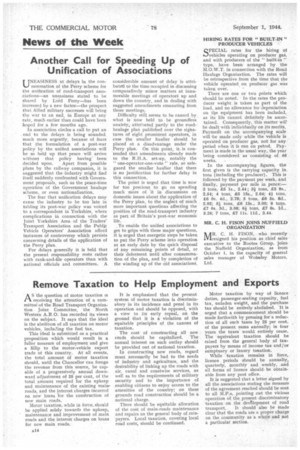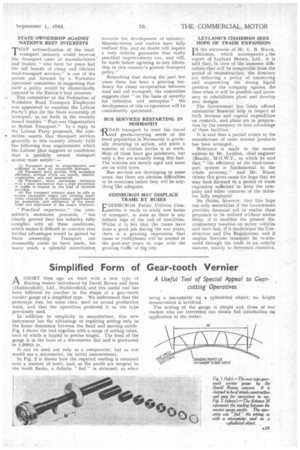News of the Week
Page 16

Page 17

If you've noticed an error in this article please click here to report it so we can fix it.
Another Call for Speeding Up of Unification of Associations
UNEASINESS at delays in the consummation of the Perry scheme for the unification of road-transport associations—an uneasiness stated to be shared by Lord Perry—has been increased by a new factor—the prospect that Allied military successes will bring the war to an end, in Europe at any rate, much earlier than could have been hoped for a few months ago.
In association circles a call to put an end to the delays is being sounded much more urgently, because of fears that the formulation of a post-war policy by the unified associations will be so held up that peace will arrive without that policy havingbeen decided upon. Apart from possible plans by the railway companies, it is suggested that the .industry might find itself suddenly confronted with Government proposals, such as the peace-time operation' of the Government haulage scheme,. or even nationalization.
The fear that unification delays may cause the industry to be too late in tabling its post-war policy was voiced to a correspondent in Yorkshire, where complications in connection with the Joint Yorkshire Area of the Traders' Transport Association and the Public Vehicle Operators' Association afford instances of controversy which persists concerning details of the application of the Perry plan.
For delays generally it is held that the present responsibility rests rather with rank-and-file operators than with national officials and committees. A considerable amount of delay is attributed to the time occupied in discussing comparatively minor matters at innumerable meetings of operators up and down the country, and in dealing with suggested amendments emanating from those meetings. Difficulty still seems to be caused by what is now held to be groundless anxiety, attributed partly to the roadhaulage plan published over the signatures of eight prominent operators, in case the smaller haulier should be placed at a disadvantage under the Perry plan. On this point, it is contended that amendments already made to the R.H.A. set-up, notably the " one-operator-one-vote " rule, so safeguard the smaller haulier that there is no justification for further delay in this connection.
The point is urged that time is now far too precious to go on spending much more of it in discussions on domestic issues about the application of the Perry plan, to the neglect of much more important questions affecting the position of the road-transport industry as part of Britain's post-war economic life.
. To enable the unified associations to get to grips with these major questions, it is urged that energetic steps be taken to put the Perry scheme into operation at an early date by the quick disposal of any remaining points of detail, or their deferment until after consummation of the plan, and by completion of the winding up of the old associations. HIRING RATES FOR " BUILT-IN " PRODUCER VEHICLES
QPECIAL rates for the hiring of s.ivehicles operating on producer gas, and with producers of the " built-in " type, have been arranged by the M.O.W.T. in connection with the Road Haulage Organization. The rates will be retrospective from the time that the vehicle operated. on producer gas was
taken over. • There are one or two points which should be noted. In the rates the producer weight is taken as part of the load, and no allowance for depreciation on the equipment has been included, as its life cannot definitely be ascertained. Consequently, this matter wil! be dealt with individually on its merits. Paymeit on the accompanying scale will 'be made only while the vehicle is operated on producer gas, not for any period when it is run on petrol. Payment is made in the usual way, the year being considered as consisting of 46 weeks.
In the accompanying figures, the first given is the carrying capacity in. tons (including the producer). This is followed by the payment per week, and finally, payment per mile in pence: 3 tons, £5 ls., 2.44; 3f tons, £5 Be., 2.54; 4 tons, £5 15s., 2.64; 4f tons, £6 Os. 4d., 2.78; 5 tons, £6 5s. 8d., 2.92; 5f tons, £6 13s., 3.00; 6 tons,
£7 Os. 3d., 3.08; 6f tons, £7 6s. id., 3.26; 7 tons, £7 I Is. lid., 3.44.
MR. C. H. FLSON JOINS NUFFIELD ORGANIZATION
NAR. C. H. FISON, who recently 1VIresigned his position as chief sales executive to the Rootes Group, joins the Nuffield Organization, as from October 1, in the capacity of general sales manager of Wolseley Motors, Ltd.
STATE OWNERSHIP AGAINST NATION'S BEST INTERESTS
T'THAT nationalization of the roadtransport industry would increase the transport costs of manufacturers• and traders " who have for years had the full benefit of cheap and efficient road-transport services," is one of the points put forward by a Yorkshire operators' committee in suggesting that such a policy would be diametrically opposed to the Nation's best interests.
This committee of the Federation of Yorkshire Road Transport Employers was appointed to examine the Labour Party's plan for the State ownership of transport, as set forth in the recently issued booklet " Post-war Organization of British Transport." In a reply to the Labour Party proposals, the com a mittee • asserts that transport services generally in this country already fulfil the following four requirements which the Labour plan suggests as conditions that a publicly owned transport system must satisfy:—
11) Transport must be comprehensive and sufficient to meet all reasonable demands.
12) Transport must provide, with maximum efRoiency, services which are speedy, reliable, comfortable, sale and economical
(3) Transport must encourage kettiatire . with a clear realization that a high proportion or sumo is created by the kind of facilities provided. (4) The transport industry must be able to ensure reasonable wages and working oondiViol*, continuity of employment, opportunities for promotion, and utilisation of the knowledge and experience of the people employed.
"Practical experience," the committee's statement proceeds, " has clearly proved that the industry fully complies with all these conditions, which makes it difficult to conceive that further advantages would be gained by State ownership. Transport can reasonably claim to have made, for many years, a splendid contribution towards the development of industry. Manufacturers and traders have fully realized this, and no doubt will require a very definite guarantee that really practical improvements can, and will, be made before agreeing to any alteration in this country's general transport policy," Remarking that during the past few years there has been a growing tendency for closer co-operation between road and rail transport, the committee suggests that " on the baths of security for initiative and enterprise " the development of this co-operation will be considerably quickened.
• BUS SERVICES RESTARTING IN NORMANDY
ROAD transport to meet the travel IN.and goods-carrying needs of the freed population in Normandy is gradually returning to action, and quite a number of civilian lorries is at work. Most of them have gas producers, but only a few are actually using this fuel. The vehicles are mostly aged and some are on solid tyres.
Bus services are developing in some areas, but there are obvious difficulties to be overcome before they will be anys thing like adequate.
EDINBURGH MAY DISPLACE TRAMS BY BUSES EDINBURGH Public Utilities Committee is ready to study new forms of transport, so soon as there is any definite sign of the end of hostilities. Whilst it is felt that the trams have done a good job daring the war years,, there is a growing impression that buses or trolleybuses will be needed in the post-war years to cope withthe growing traffic of ths city. LEYLAND'S CHAIRMAN SEES HOPE OF TRADE EXPANSION IN the statement of Mr. C. B. Nixon, Ichairman, which accompanies i the report of Leylarld Motors, Ltd., it is said that, in view of the immense difficulties that will be inseparable from the period of reconstruction, the directors are following a policy of conserving and augmenting the strong liquid position of the company against the time when it will be possible and necessary to rehabilitate plant and develop new designs.
The Government has lately offered substantial financial help in respect of both revenue and capital expenditure on research, and plans are in preparation by the company to take advantage of these facilities.
It is said that a partial return to the manufacture of more normal -products has been arranged.
Reference is made to the recent address by Mr. Lyddon, chief engineer (Roads). M.O.W.T., in which he said that " the efficiency of the road-transport system is fundamental to the whole economy," and Mr. Nixon thinks this gives cause for hope that we may look forward to a period of trade expansion sufficient to keep the company and other concerns in the industry fully employed
He thinks, however, that this hope can only materialize if the Government provides financial aid to enable these proposals to be realized without undue delay, if it modifies the present discriminatory taxation on motor vehicles and their fuel, if it modernizes theConstruction and Use Regulations, and if surplus Services transport he re-allocated through the trade in an orderly manner, mainly to distressed countries,




















































